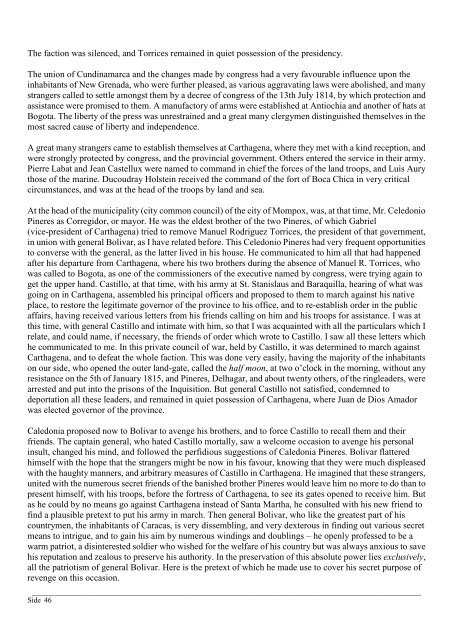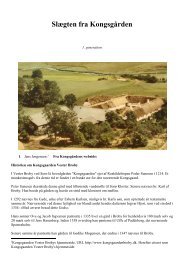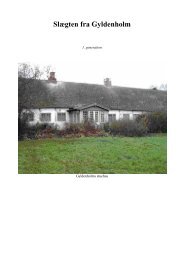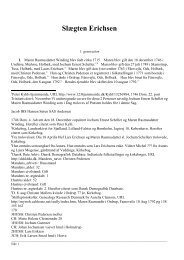- Page 1 and 2: Christophe Vuillaumes efterslægt 1
- Page 3 and 4: 1685. De nombreux protestants, qui
- Page 5 and 6: Peter Villaume Portrætsamlingen, D
- Page 7 and 8: Fyrendal Kirke 34. Peter Villaume (
- Page 9 and 10: Seminariet og Opdragelsesanstalten
- Page 11 and 12: praktischen Wissenscha ften, in all
- Page 13 and 14: Viele Menschen sind verdorben; solc
- Page 15 and 16: wegen der individuellen Fähigkeite
- Page 17 and 18: errichten. Wie hat Deine Liebe mein
- Page 19 and 20: hjalp ham med Føde, Penge og Klæd
- Page 21 and 22: ici des côteaux fertiles, là du b
- Page 23 and 24: les plus pesantes. Ces 6 personnes
- Page 25 and 26: Gleise, Hurrah ! Sibille reiset bal
- Page 27 and 28: appelee à le remplacer. Trolleb. c
- Page 29 and 30: Datteren Sophie Henriette, der 4. J
- Page 31 and 32: + 37 ii. Charles Antoine Villaume b
- Page 33 and 34: Mangin Willaume, Christophe Vuillau
- Page 35 and 36: ―Le sieur Willaume-Ducoudray, off
- Page 37 and 38: The three prisoners of Olmutz owe t
- Page 39 and 40: stemme, der råbte, Macdonald, Macd
- Page 41 and 42: I am perfectly recovered and have b
- Page 43 and 44: At that time were assembled at Cart
- Page 45: the other. General Ducoudray, as so
- Page 49 and 50: unjustly, namely the commodore Aury
- Page 51 and 52: all the particulars communicated to
- Page 53 and 54: general-in-chief to be placed in th
- Page 55 and 56: de la peste qui commençait à sév
- Page 57 and 58: for Los Cayos ekspeditionens afrejs
- Page 59 and 60: Jeannet-Oudin, imposa des règles p
- Page 61 and 62: Wischaur var ved at rekruttere 200
- Page 63 and 64: the laws,‖ I transmit to the Hous
- Page 65 and 66: ut to endeavor to kill all hands an
- Page 67 and 68: American vessel. This vessel was ou
- Page 69 and 70: To arms, companions, to arms! Live
- Page 71 and 72: Brev fra John Quincy Adams til John
- Page 73 and 74: charges numerous times for the item
- Page 75 and 76: among others the account found in S
- Page 77 and 78: 45 ii. Karl Friedrich August Ducoud
- Page 79 and 80: gjort ,en Retirade å la Xenophon"
- Page 81 and 82: døbt den 30 oktober 1817 i Vor Fru
- Page 83 and 84: Sophie Henriette Villaume i Borreby
- Page 85 and 86: Sparekassedirektionen havde beslutt
- Page 87 and 88: Hans kone tog nu ham i en hast og v
- Page 89 and 90: lev bisat fra Næstved den 30 maj 1
- Page 91 and 92: Hun blev bisat fra Thisted den 20 m
- Page 93 and 94: Gertruida Maria Rutten, datter af J
- Page 95 and 96: var snedker. 2. bryllup ikke fundet
- Page 97 and 98:
datter af Søren Ørum og Kirstine
- Page 99 and 100:
Diligencen kører 1830 ind i Postg
- Page 101 and 102:
foretrækker at vente, til der komm
- Page 103 and 104:
i en alder af 89 år. De seks børn
- Page 105 and 106:
108 iv. Julie Ane Primon blev født
- Page 107 and 108:
den 26 april 1834 i Næstved i en a
- Page 109 and 110:
Bischoff og Marie Villaume i Næstv
- Page 111 and 112:
lev gift den 25 juni 1873 i Vor Fre
- Page 113 and 114:
Wilhelmine Villaume i Thisted. 254
- Page 115 and 116:
fadder ved dåben af Frederikke Chr
- Page 117 and 118:
folketællingen i 1850 som boende h
- Page 119 and 120:
gift den 5 august 1867 i Kristrup,
- Page 121 and 122:
som boende i Koed, Sønderhald, Ran
- Page 123 and 124:
egistreret i folketællingen i 1855
- Page 125 and 126:
er registreret i folketællingen i
- Page 127 and 128:
Thisted. Han blev døbt den 13 apri
- Page 129 and 130:
i 1840 som boende i Nyborg. Hun er
- Page 131 and 132:
immigrerede den 21 juni 1883 til Mi
- Page 133 and 134:
Sønderhald, Randers. Jens blev gif
- Page 135 and 136:
Öppnade 1905 skrädderi i Kungsbac
- Page 137 and 138:
Alfred Waldemar Villaume 88. Alfred
- Page 139 and 140:
Er ikke døbt. 458 Hun er registrer
- Page 141 and 142:
Han blev født den 21 december 1848
- Page 143 and 144:
den 2 august 1828 i Holbæk. 496 Ha
- Page 145 and 146:
var premierløjtnant. Han blev fød
- Page 147 and 148:
november 1916. 524 + 219 ii. Sigrun
- Page 149 and 150:
Kendetegnende for Wilhelm Kruuse va
- Page 151 and 152:
Nyborg. 553 Han grundlagde Nyborg E
- Page 153 and 154:
Hun blev døbt den 21 august 1849 i
- Page 155 and 156:
Rudolph Theobald Zielian Rudolph Th
- Page 157 and 158:
som boende i Silkeborg. 248 ix. Eig
- Page 159 and 160:
oende i Tårnborg, Slagelse, Sorø.
- Page 161 and 162:
Andreassen Stech, datter af Frantz
- Page 163 and 164:
120. Jeppe Johannes Prætorius Bisc
- Page 165 and 166:
124. Harald Odin Christensen (Adolp
- Page 167 and 168:
Frederiksborg. Hun blev døbt den 1
- Page 169 and 170:
gift den 30 maj 1902 i København m
- Page 171 and 172:
294 ii. Olavia Christensen blev fø
- Page 173 and 174:
af denne. De fleste steder i beskri
- Page 175 and 176:
Det var så beretningen om 2 regime
- Page 177 and 178:
1899 Grenå. 722 Han var fadder ved
- Page 179 and 180:
296 ii. Hans Peter Henrich Graff bl
- Page 181 and 182:
navneloven af 1904 tilladelse til a
- Page 183 and 184:
Dygtighed er anerkendt." Graff komm
- Page 185 and 186:
Han og Margrethe Nielsen Nørbye er
- Page 187 and 188:
Margrethe Nielsen Nørbye i Esbjerg
- Page 189 and 190:
Status i husstand: Søn 1904 som bo
- Page 191 and 192:
København den 1 maj 1913. 825 312
- Page 193 and 194:
hos Johan Frederich Graff og Caroli
- Page 195 and 196:
i 1840 som boende hos Jens Rasmusse
- Page 197 and 198:
Lisbjerg, Randers, i 1900. Han og C
- Page 199 and 200:
Jensine Graff, datter af Waldemar E
- Page 201 and 202:
1856 i Grenå. 917 Han er registrer
- Page 203 and 204:
folketællingen i 1901 som boende i
- Page 205 and 206:
Min farfar, Rasmus Christian Rasmus
- Page 207 and 208:
i Grenå. 980 Han døde den 2 juli
- Page 209 and 210:
som boende hos Ernst Eberhardt Herm
- Page 211 and 212:
Drejer i Rønne. 1015 Martinus blev
- Page 213 and 214:
Eberhardt Herman Graff er registrer
- Page 215 and 216:
tjenstgørende fra den 18. januar 1
- Page 217 and 218:
Fyn. Den 1. maj 1864 befandt Waldem
- Page 219 and 220:
Kirstine Sørensen, datter af Josva
- Page 221 and 222:
i Tilsted, Hundborg, Thisted. 1071
- Page 223 and 224:
Thisted, med Andreas Hansen, søn a
- Page 225 and 226:
Thisted. 1129 Han var fadder ved d
- Page 227 and 228:
folketællingen i 1901 som boende h
- Page 229 and 230:
1921. 1174 De syv børn til Dorthea
- Page 231 and 232:
Thisted. 1200 Karoline blev gift de
- Page 233 and 234:
Hillerslev, Thisted. Han blev døbt
- Page 235 and 236:
døbt den 3 juni 1853 i Svendborg.
- Page 237 and 238:
400 vii. Marie von Seelen. Marie bl
- Page 239 and 240:
i 1900 som boende i Grand Rapids, K
- Page 241 and 242:
september 1903 i Grand Rapids, Kent
- Page 243 and 244:
Vognmagergade 25, men boede der ikk
- Page 245 and 246:
18 april 1886 med Ida Charlotte Car
- Page 247 and 248:
alder af 49 år. 172. Roswell Percy
- Page 249 and 250:
+ 432 ii. Alf Fridolf Johansson lev
- Page 251 and 252:
Ernst Julius Villaume Ernst & Elfri
- Page 253 and 254:
Julianna never married Ernst Julius
- Page 255 and 256:
Fra The Brisbane Courier, Monday 15
- Page 257 and 258:
De to børn til Charles Peter Juliu
- Page 259 and 260:
215. Johanne Sophie Winsløw (Sophi
- Page 261 and 262:
vielsen af Casper Frederik Lassen o
- Page 263 and 264:
Kauffmann): London, Reykjavik og, e
- Page 265 and 266:
De to børn til Johanne Schalburg o
- Page 267 and 268:
tog eksamen som student i 1895. Han
- Page 269 and 270:
Han immigrerede cirka 1924. Han var
- Page 271 and 272:
Werner Waltio og Karl Drucke samt d
- Page 273 and 274:
søster ved at gå i krig mod bolsj
- Page 275 and 276:
On the night of September 29th - 30
- Page 277 and 278:
Appeal dismissed an appeal made in
- Page 279 and 280:
Sixty-six years after her capture i
- Page 281 and 282:
30 September 1940 The agents are fl
- Page 283 and 284:
i København. 1439 Han flyttede til
- Page 285 and 286:
døde den 14 maj 1956 i en alder af
- Page 287 and 288:
Der var ingen børn efter Sophus Em
- Page 289 and 290:
folketællingen i 1885 som boende i
- Page 291 and 292:
eksamen som student i 1884 i Viborg
- Page 293 and 294:
Hans Henrik Koch 1905-1987 Departem
- Page 295 and 296:
295. Carl Johan Frederich Graff (Er
- Page 297 and 298:
535 v. Erna Lydia Rigmor Meinertz G
- Page 299 and 300:
folketællingen i 1901 som boende i
- Page 301 and 302:
13. fra venstre i 3. øverste rækk
- Page 303 and 304:
forældrene ikke regnede sig til Fo
- Page 305 and 306:
Han og Louise Sofie Frederikke Pete
- Page 307 and 308:
Fødested: Esbjerg Gade/vej: Jyllan
- Page 309 and 310:
De fire børn til Marius Julius Gra
- Page 311 and 312:
den 30 september 1888 i Ebeltoft. 1
- Page 313 and 314:
Graff, datter af Waldemar Emil Theo
- Page 315 and 316:
+ 577vii. Alf Sikker Hansen blev f
- Page 317 and 318:
cand. theol i januar 1902. Han var
- Page 319 and 320:
604 v. Otto Edvard Nielsen blev fø
- Page 321 and 322:
Erland blev gift med Erna (--?--).
- Page 323 and 324:
Tilsted, Hundborg, Thisted. Hun ble
- Page 325 and 326:
Christen Christensen blev født den
- Page 327 and 328:
Molly (--?--) lever stadig. 626 vii
- Page 329 and 330:
Thisted. 1811 Hun og Martinus Jeppe
- Page 331 and 332:
+ 650iii. Sigrid Elisabeth Hartmann
- Page 333 and 334:
+ 658 i. Svend Oluf von Seelen leve
- Page 335 and 336:
Det eneste barn til Emily E. Fabric
- Page 337 and 338:
David K. (9), b. Illinois, parents
- Page 339 and 340:
demonstrating ―Caring Excellence
- Page 341 and 342:
Many others agree, from family frie
- Page 343 and 344:
Lars Strömer 1881 lever stadig. De
- Page 345 and 346:
Alexander John Simpkins gravsten i
- Page 347 and 348:
Published [Sydney : Australia Music
- Page 349 and 350:
student i 1906 i Frederiksborg. Han
- Page 351 and 352:
Richard Ringstrup Jensen; 1909 Fra
- Page 353 and 354:
Holger Eigil Foss 1916 blev født d
- Page 355 and 356:
494. Ernst August Nachtegall Haderu
- Page 357 and 358:
I St. Petersborg kom Christian Fred
- Page 359 and 360:
Kun en national-socialistisk opdrag
- Page 361 and 362:
som soldat og officer, men fordi ha
- Page 363 and 364:
Christian von Schalburg vil evigt v
- Page 365 and 366:
Kommandører for SS-Division Totenk
- Page 367 and 368:
Nord-germanen, der svang sit værge
- Page 369 and 370:
Høgh-Sørensen, Erik, Dansk dødsp
- Page 371 and 372:
Alexander Schalburg 727 i. Aleksand
- Page 373 and 374:
allotments med flygbolag, hotell oc
- Page 375 and 376:
Anna Sophie Seidelin (1913 - 1998)
- Page 377 and 378:
+ 731 ii. Sophie Elisabeth Seidelin
- Page 379 and 380:
741 i. Kirsten Bischoff lever stadi
- Page 381 and 382:
Under studietiden kom Sigvard i kon
- Page 383 and 384:
en alder af 78 år. De tre børn ti
- Page 385 and 386:
folketællingen i 1921 som boende h
- Page 387 and 388:
Han lever stadig. Lilian Anita Niel
- Page 389 and 390:
Elisabeth Iversen, datter af Morten
- Page 391 and 392:
og Louise Sofie Frederikke Petersen
- Page 393 and 394:
Vuillaume). 2003 Waldemar blev udda
- Page 395 and 396:
isat fra København den 3 oktober 1
- Page 397 and 398:
Uddannelse: I Malerlære i Aalborg
- Page 399 and 400:
folketællingen i 1925 som boende h
- Page 401 and 402:
1911-94, provisor, kvindepolitisk a
- Page 403 and 404:
Gudrun Elise Rasmussen 589. Gudrun
- Page 405 and 406:
*Created and coordinated the first
- Page 407 and 408:
862 ii. Kjeld Willaume Christoffers
- Page 409 and 410:
599. Gaston Edvard Ludvig Møller (
- Page 411 and 412:
lev født den 15 december 1908 i Th
- Page 413 and 414:
895 x. Laila Willaume 2119 lever st
- Page 415 and 416:
Else Wøldike som konfirmand Else W
- Page 417 and 418:
København. Ellen blev gift den 30
- Page 419 and 420:
Børn af Sigrid Elisabeth Hartmann
- Page 421 and 422:
Pierre, Daniel, Jacques, Daniel, Ma
- Page 423 and 424:
Østerbølle, Rinds, Viborg. 2197 A
- Page 425 and 426:
Der var god tid til at lade tankern
- Page 427 and 428:
667. Georgia Hill (David Kimball, B
- Page 429 and 430:
948 ii. Richard Demén-Villaume; 22
- Page 431 and 432:
Charles Antoine, Peter, Pierre, Dan
- Page 433 and 434:
991 iii. Andrew Simpkins 2250 lever
- Page 435 and 436:
Julius, Charles Antoine, Peter, Pie
- Page 437 and 438:
Han lever stadig. 719. Tine Begtrup
- Page 439 and 440:
Bent Rasmussen: 53 danske børnebog
- Page 441 and 442:
fundamental ensomhedsfølelse, selv
- Page 443 and 444:
siger hun. Allerede fra 13-14-års
- Page 445 and 446:
hårdere stoffer. Tine Bryld blev t
- Page 447 and 448:
- som underviser, som forfatter og
- Page 449 and 450:
+ 1019i. Iben Bryld Gaardmand lever
- Page 451 and 452:
ussisk og oldislandsk, og en russis
- Page 453 and 454:
Daniel, Mangin Willaume, Christophe
- Page 455 and 456:
Christians, København, med Kirsten
- Page 457 and 458:
752. Nina Robbert (Helge, Robert Al
- Page 459 and 460:
folketællingen i 1925 som boende i
- Page 461 and 462:
Caroline Petrine Frederiche Villaum
- Page 463 and 464:
+ 1103iii. Henrik Edwin Winther lev
- Page 465 and 466:
De to børn til Elisabeth Christoff
- Page 467 and 468:
Serviet, udført af Kirsten Sikker
- Page 469 and 470:
2381 Ibid. 2382 Ibid. elderly are t
- Page 471 and 472:
1154 iv. Arne Sikker Jensen-Holm 23
- Page 473 and 474:
824. Erik Sikker Hansen (Eli, Valbo
- Page 475 and 476:
Lise la Cour; 2414 Fra Dansk Kvinde
- Page 477 and 478:
De to børn til Carl Gustav Willaum
- Page 479 and 480:
Eva Marie Dinesen 2453 lever stadig
- Page 481 and 482:
Yvonne Ekas Nielsen 2481 lever stad
- Page 483 and 484:
Pedersen. Hun døde den 7 marts 200
- Page 485 and 486:
904. Kurt Johan Christensen (Lars C
- Page 487 and 488:
910. Carsten Mossin Christensen (Ta
- Page 489 and 490:
930. (--?--) von Seelen (Svend Oluf
- Page 491 and 492:
Joy Mills 2526 lever stadig. De to
- Page 493 and 494:
980. Denise Johnstone (Miriam Simpk
- Page 495 and 496:
lever stadig. Hanne Berg lever stad
- Page 497 and 498:
Ou… peut-être, es tu arrivé ici
- Page 499 and 500:
Erik Baltzar lever stadig. De to b
- Page 501 and 502:
at PRP Group, a Weber Shandwick Aff
- Page 503 and 504:
De to børn til Johanna Cecilie Chr
- Page 505 and 506:
ny borgerskab. Sønnen vælger derf
- Page 507 and 508:
1380 iv. Mariche Isabell Kristensen
- Page 509 and 510:
IT-medarbejder hos Toft A/S, Køben
- Page 511 and 512:
Sokkelund, København. Hun blev fø
- Page 513 and 514:
Det eneste barn til Lorelle Ivy Mur
- Page 515 and 516:
Pierre, Daniel, Jacques, Daniel, Ma
- Page 517 and 518:
Andreasen Axel Vilhelm (1873- ) ...
- Page 519 and 520:
Michael ...........................
- Page 521 and 522:
Erika .............................
- Page 523 and 524:
Eklund Ernst Alfred (1868-1923)....
- Page 525 and 526:
Ernst Eberhardt Herman (1831-1916)
- Page 527 and 528:
Georgia ...........................
- Page 529 and 530:
Algot (1880- ) ....................
- Page 531 and 532:
Kurt ..............................
- Page 533 and 534:
Curth Roland Graff (1921-2009) ....
- Page 535 and 536:
Metha Christine (1845-1926) .......
- Page 537 and 538:
Marc Alexander ....................
- Page 539 and 540:
Valter (1900-1967) ................
- Page 541 and 542:
Peter Martin ......................
- Page 543 and 544:
Elena Vasiljevna Starizkaja (1882-1





